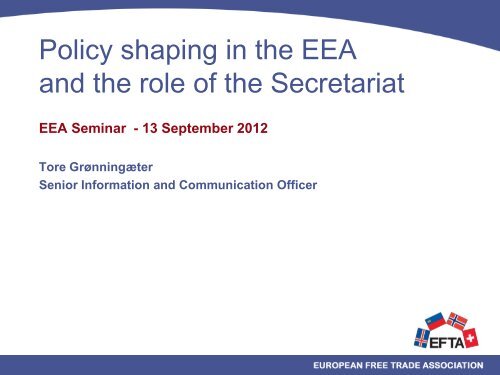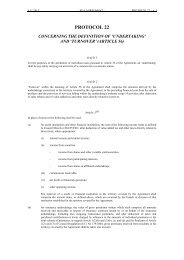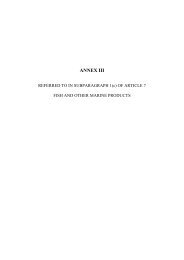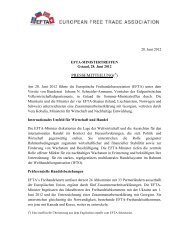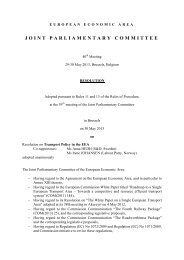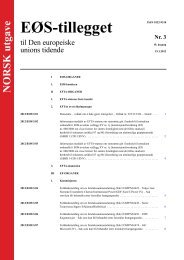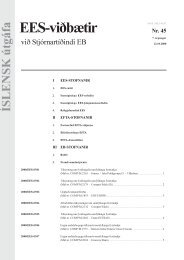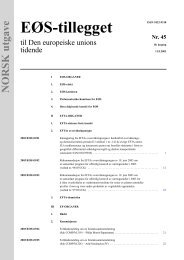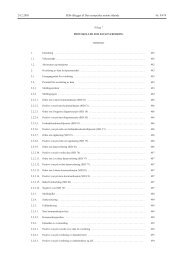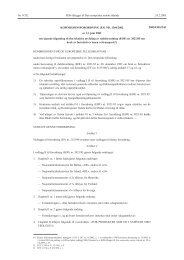Tore Grønningsæter - EFTA
Tore Grønningsæter - EFTA
Tore Grønningsæter - EFTA
Create successful ePaper yourself
Turn your PDF publications into a flip-book with our unique Google optimized e-Paper software.
Policy shaping in the EEA<br />
and the role of the Secretariat<br />
EEA Seminar - 13 September 2012<br />
<strong>Tore</strong> Grønningæter<br />
Senior Information and Communication Officer
<strong>EFTA</strong> activities: three pillars<br />
Intra-<strong>EFTA</strong> trade<br />
Stockholm Convention 1960<br />
Updated Vaduz Convention 2001<br />
<strong>EFTA</strong>-4<br />
Geneva Office<br />
<strong>EFTA</strong><br />
Free Trade Agreements<br />
With the EEC before 1994<br />
Central and Eastern Europe<br />
Third Countries outside Europe<br />
<strong>EFTA</strong>-4<br />
Geneva Office<br />
EEA Agreement<br />
Access to the Internal Market<br />
Signed 1992, in force 1994-<br />
<strong>EFTA</strong>-3<br />
Brussels Office<br />
Luxembourg Office (Statistics)
Structure of my presentation<br />
1. EEA – scope and character<br />
2. The formal decision-making process<br />
3. Decision-shaping: can we influence?
1. EEA – scope and character
Jacques Delors’ White Paper (1985)<br />
Three barriers to creating a Single Market<br />
• Physical<br />
• Technical<br />
• Fiscal
Single European Act (1987)<br />
- Removing the obstacles within end of 1992<br />
- Extending the policy areas:<br />
• Social policy<br />
• Environment<br />
• Research
European Economic Area -<br />
extending the EU Single Market<br />
Four Freedoms<br />
• Free movement of goods<br />
• Free movement of services<br />
• Free movement of capital<br />
• Free movement of persons<br />
Horizontal policies<br />
• Environment<br />
• Social policy<br />
• Consumer protection<br />
• Statistics<br />
• Company law<br />
Common Rules<br />
• State Aid<br />
• Competition<br />
Cooperation<br />
• EU Programmes<br />
• EU Agencies<br />
Cohesion<br />
• EEA Grants / Norway Grants
EEA - static and dynamic<br />
• Static in scope<br />
No additional areas foreseen to be included in the Agreement<br />
• Dynamic in character<br />
Updated continuously by adding new EU legislation<br />
in areas already covered by the Agreement
Extending EU law and cooperation<br />
8800 EU acts incorporated into the EEA Agreement<br />
• 1850 at the signing (1992)<br />
• 5950 added by the EEA Joint Committee<br />
• 1000 added by simplified procedures<br />
~ 4 600 acts in force today in EEA<br />
~15 000 acts in force today in EU<br />
• 17 EU programmes and 13 agencies in the EEA
But...<br />
• Limited to cross-border activites<br />
• No third-country issues<br />
Exception: Food safety (veterinary package 1999)
Cooperation: 17 EU programmes<br />
• Research framework programme<br />
• Lifelong learning and Erasmus Mundus<br />
• Satellite navigation (Galileo) (only Norway)<br />
• Competetiveness and Innovation Programme<br />
• Youth in action<br />
• Media<br />
• Employment and Social Solidarity (Progress)<br />
• Intermodal transport (Marco Polo)<br />
• Culture<br />
• Health<br />
• Community statistics<br />
• Civil protection<br />
• Consumer policy<br />
• Interoperability solutions for public administrations<br />
• Protecting children using the internet<br />
• Combating violence (Daphne)<br />
• Drug prevention
Participation in 13 EU Agencies<br />
• European Agency for Safety and Health at Work<br />
• European Aviation Safety Agency<br />
• European Centre for Disease Prevention and Control<br />
• European Centre for the Development of Vocational Training<br />
• European Chemicals Agency<br />
• European Environment Agency<br />
• European Food Safety Authority<br />
• European Foundation for the Improvement of Living and Working Conditions<br />
• European GNSS Agency<br />
• European Maritime Safety Agency<br />
• European Medicines Agency<br />
• European Network and Information Security Agency<br />
• European Railway Agency
The EEA does not cover:<br />
• EU Customs Union (towards third countries)<br />
• Common Agricultural and Fisheries Policies<br />
• EU Regional Policy<br />
• Common Trade Policy<br />
• Economic and Monetary Union<br />
• Justice and Home Affairs<br />
• Common Foreign, Security and Defence Policy
2. The decision-making process
DECISION-<br />
SHAPING<br />
EEA<br />
DECISION-<br />
MAKING<br />
EEA DECISION-<br />
TAKING<br />
COMMISSION<br />
Consultation � Proposal<br />
EUROPEAN PARLIAMENT AND COUNCIL<br />
Discussion � Adoption<br />
EEA <strong>EFTA</strong><br />
Standard Sheet<br />
<strong>EFTA</strong><br />
WORKING<br />
GROUPS<br />
EEA<br />
SUB-<br />
COMMITTEE<br />
EEA JOINT COMMITTEE<br />
Decision<br />
<strong>EFTA</strong><br />
STANDING<br />
COMMITTEE<br />
NATIONAL IMPLEMENTATION<br />
Comitology<br />
groups
EU adopts new legislation...
The <strong>EFTA</strong> Standard Sheet
EEA decision-making<br />
<strong>EFTA</strong> Standing<br />
Committee<br />
<strong>EFTA</strong> Subcommittees<br />
<strong>EFTA</strong> Working<br />
Groups<br />
Adopted<br />
EEA<br />
relevant EU<br />
legislation<br />
Draft decision<br />
EEA Joint<br />
Committee<br />
Decision<br />
Constitutional<br />
requirements<br />
Article 103 EEA<br />
Entry into force<br />
Implementation in national law<br />
(Iceland, Liechtenstein, Norway)<br />
Council<br />
European<br />
External Action<br />
Service (EEAS)<br />
Commission<br />
<strong>EFTA</strong><br />
Surveillance<br />
Authority
EEA <strong>EFTA</strong> Bodies<br />
STANDING COMMITTEE<br />
OF THE <strong>EFTA</strong> STATES<br />
Free Movement of<br />
Goods<br />
• Competition<br />
• Customs Matters<br />
• Energy Matters<br />
• Fisheries<br />
• Intellectual<br />
Property<br />
• Processed<br />
Agricultural<br />
Products<br />
• Public<br />
Procurement<br />
• State Aid<br />
• Technical Barriers<br />
to Trade (TBT)<br />
Committees of Members<br />
of Parliament<br />
Consultative Committee<br />
Subcommittee I – IV Subcommittee V<br />
Free Movements<br />
of Capital and<br />
Services<br />
• Company Law<br />
• Electric<br />
Communications,<br />
Audiovisual<br />
Services and<br />
Information Society<br />
• Financial Services<br />
• Postal Services<br />
Free Movement of<br />
Persons<br />
• Free Movement of<br />
Persons,<br />
Employment and<br />
Social Policy<br />
• Recognition of<br />
Professional<br />
Qualifications<br />
• Social Security<br />
Flanking and<br />
Horisontal<br />
Policies<br />
• Budgetary Matters<br />
• Civil Protection<br />
• Consumer Affairs<br />
• Cultural Affairs<br />
• Education,<br />
Training and Youth<br />
• Enterprise Policy<br />
• Environment<br />
• Gender Equality…<br />
• Statistics<br />
• Health and Safety<br />
• Research and<br />
Development<br />
Legal and<br />
Institutional<br />
Matters
Draft Joint Committee Decision submitted<br />
to the EU
EEA decision making on<br />
the EU side<br />
European<br />
Commission<br />
DIRECTORATE-<br />
GENERALS<br />
LEGAL<br />
SERVICE<br />
DG BUDGET<br />
EEA <strong>EFTA</strong> States’<br />
position<br />
European External<br />
Action Service<br />
(EEAS)<br />
EU’s position<br />
Council<br />
If adaptations or financial<br />
contributions are involved<br />
COUNCIL<br />
(Ministers)<br />
COREPER<br />
(Ambassadors)<br />
WORKING GROUP<br />
ON<br />
<strong>EFTA</strong> MATTERS
EEA decision-making<br />
<strong>EFTA</strong> Standing<br />
Committee<br />
<strong>EFTA</strong> Subcommittees<br />
<strong>EFTA</strong> Working<br />
Groups<br />
Adopted<br />
EEA<br />
relevant EU<br />
legislation<br />
Draft decision<br />
EEA Joint<br />
Committee<br />
Decision<br />
Constitutional<br />
requirements<br />
Article 103 EEA<br />
Entry into force<br />
Implementation in national law<br />
(Iceland, Liechtenstein, Norway)<br />
Council<br />
European<br />
External Action<br />
Service (EEAS)<br />
Commission<br />
<strong>EFTA</strong><br />
Surveillance<br />
Authority
Incorporation into the EEA
... Annex XIII - Transport
...and translated and published
3. Decision-shaping
Decision shaping<br />
Access varies as to who we are approaching<br />
Commission: right to participate, but not to vote<br />
• EEA Art. 99 Expert groups<br />
• EEA Art. 100 Comitology committees<br />
• EEA Art. 81 Programme committees<br />
• EEA Art 101 Other (advisory) groups<br />
• EEA decisions Agency boards etc.<br />
European Parliament: no access, but open process<br />
Council: no access, but informal approach
DECISION-<br />
SHAPING<br />
EEA<br />
DECISION-<br />
MAKING<br />
EEA DECISION-<br />
TAKING<br />
COMMISSION<br />
Consultation � Proposal<br />
EUROPEAN PARLIAMENT AND COUNCIL<br />
Discussion � Adoption<br />
EEA <strong>EFTA</strong><br />
Standard Sheet<br />
<strong>EFTA</strong><br />
WORKING<br />
GROUPS<br />
EEA<br />
SUB-<br />
COMMITTEE<br />
EEA JOINT COMMITTEE<br />
Decision<br />
<strong>EFTA</strong><br />
STANDING<br />
COMMITTEE<br />
NATIONAL IMPLEMENTATION<br />
Comitology<br />
groups
• Commission consultations<br />
• Commission comitology groups<br />
• EU Agencies<br />
• <strong>EFTA</strong> Working Groups, including<br />
EEA <strong>EFTA</strong> Comments<br />
• <strong>EFTA</strong> Advisory Bodies
<strong>EFTA</strong> Consultative Committee<br />
• Shape <strong>EFTA</strong> and EEA policies<br />
• Influence relevant policies<br />
• Raise awareness of <strong>EFTA</strong>/EEA issues in social<br />
partners<br />
• Provide a forum for dialogue<br />
Meetings with<br />
- <strong>EFTA</strong> Ministers and Ambassadors<br />
- <strong>EFTA</strong> Parliamentarians<br />
- EU Social Partners
<strong>EFTA</strong> Parliamentary Committee<br />
• Scrutinise <strong>EFTA</strong> policies and EEA legislation<br />
• Raise awareness of important issues<br />
• Build political consensus<br />
• Advocate for <strong>EFTA</strong> and the EEA in the national parliaments<br />
• Facilitate political dialogue<br />
Meetings with<br />
- <strong>EFTA</strong> Ministers and Social Partners<br />
- Representatives from the EEA Council and Joint Committee<br />
- Members of the European Parliament
More information….<br />
www.efta.int


